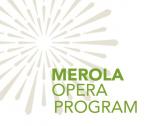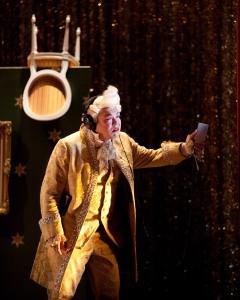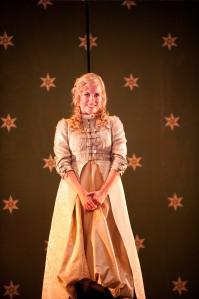 25 Young Artists. 7 Performances. And individual training, training, training galore.
25 Young Artists. 7 Performances. And individual training, training, training galore.
The Merola Opera Program is the training and performance program for emerging young artists affiliated with San Francisco Opera. Named for San Francisco Opera’s first general director, Gaetano Merola, Merola Opera began during the 1954-55 season and established its full training program in 1957.
Merola has served as a proving ground for hundreds of artists, including Susan Graham, Thomas Hampson, Anna Netrebko, Patricia Racette, Rolando Villazón, Deborah Voigt, and Dolora Zajick.
In short, Merola challenges and nurtures the “who’s who” of future opera stars.
Merola provides that bridge young artists need to access the professional opera world. Tenor David Lomeli, currently performing at the Santa Fe Opera Festival, was a Young Artist at Merola in 2008, wholeheartedly agrees:
For me, Merola was the place where the real world started, where I went from general training to specific training. I got to work with Chuck Hudson and Catherine Malfitano in my acting and with my teacher Cesar Ulloa that happened to be in Merola as a master teacher. I also got lots of work from it. They really work on giving you as much exposure as they can. It’s a program about the young artists–they are the principals of the shows–so everyone gets a shot on the spotlight. –Tenor David Lomeli
Last week Merola artists or “Merolini” as they are dubbed presented four performances of Il barbiere di Siviglia. In ten days, Merola concludes its 54th summer program for young artists with a Grand Finale and Reception.
By all accounts, this season was very successful. Operatoonity interviewed Sheri Greenawald, Director of the San Francisco Opera, who talked about this year’s program as well as plans for recruiting next year’s Merolini.

Peixin Chen as Basilio in the Friday/Sunday cast of 'Barbiere' |Photo by Kristen Loken
Sheri, how do young artists find out about Merola? (For instance, the artists from China, South Korea, Inner Mongolia, Venezuela, etc.) We don’t ask singers how they hear about us, so I am guessing a bit when I answer. We generally advertise our audition in Opera News and Classical Singer, and in addition, I would assume singers must know about YapTracker, where we now have our applications. Word of mouth is often the best way to hear about programs and with Merola’s reputation out there, I would be guess this is a big way that young artists hear about Merola. Some singers come to us via recommendation, as well. For example, Peixin Chen, a current Merola bass, was recommended by Francesca Zambello who heard him in China when he sang Zuniga in her production of Carmen in Beixing.
Can you tell readers about the annual process of recruiting/selecting a company? Audition announcements go out in August. When the applications come in, we vet them and determine which singers will get an audition. Mark Morash and I personally audition singers in four cities, San Francisco, Houston, Chicago and New York City. At the end of this process, which generally means we hear and interview 400-500 singers, 30-50 pianists, and about 25 stage directors, we make our selection of the group. It is a huge undertaking but it is the best way, and really the only way, to really experience the vast talent out there and make our choices.
What sets Merola apart from other young artist programs, i.e., do you have more international artists than others; more success stories, greater numbers? What distinguishes Merola from other summer programs (and I stipulate that we are talking about summer training programs, not permanent Young Artist Programs attached to a particular company) is that the focus is totally on individual training. We may use the singers to provide a small chorus for an opera, but we do our best to limit their involvement to as few a number of rehearsals as possible, so that they can still be having individual coachings every day. My particular focus is to send all the Merolini home in better shape than when they arrived. With the amazing coaches and teachers that we assemble for the summer, that is a fairly easy goal to achieve. We do accept non-US citizens into our program, but I wouldn’t say that is what makes Merola great. It really is about the individual attention that each of them receives.

Suzanne Rigden as Rosina in the Thursday/Sunday cast of 'Barbiere' | Photo by Kristen Loken
A related question, what in your estimation accounts for the program’s growth from a four-week to a twelve-week program? Merola deserves its reputation as one of the world’s most important training programs, not only because of the level of artistic offering but also because of the dedicated and smart board leadership. Merola has grown steadily throughout its 54 year history – in 1958, the program went from 4 weeks to 6 weeks, another bump to seven came in 1962 and as the program entered its second decade, the program expanded to 10 weeks and now, at the age of 54, we are at 11 weeks. We’ve also always been on the lookout for new opportunities to offer, so the program now includes language, stage movement, career coaching, etc. We have evolved with the ages, but as you know, slow and steady wins the race and Merola has always been conservative financially and ambitious artistically.
Where do Merola artists go after completing the program? The path for young singers is as varied as the voices of young singers. Merola is known as the gateway to San Francisco Opera’s Adler Fellowship Program, so some of the Merolini do go on to this program. Others who participate in Merola are already committed to the year-round young artist programs at other major companies. Some of them go back to school for further study, and some of them go directly into the world with professional contracts at companies. Opera is a complex field and successful artists take different paths towards that success.
Can you tell me more about the Merola event that took place on June 25 of this year? Who auditioned for what and who had the privilege of sitting in? The General Director’s Auditions are basically for David Gockley, perhaps also Nicola Luisotti, and also the San Francisco Opera’s artistic staff. This is the first time David Gockley hears them, however they are not auditioning for anything in particular. It is the start of his impression of them as singers and artists. And since Mr. Gockley is the head of the committee that selects the Adler Fellows, I suppose one could argue that this is the first step toward gaining an Adler Fellowship. For this event, Merola has a select group of patrons who are invited and so the event has a different feel than a normal audition. It’s a nerve wracking time for the singers, but the invited audience learns a lot about a singer’s journey and the artistic staff gets a chance to hear all the Merolini on one night.
Has technology impacted your outreach to artists and/or patrons and audiences? From the perspective of our artistic process, the broad reach of Internet has enabled us to expand our reach to singers. Certainly being able to do applications online has sped up that process. Merola’s excellent marketing team is very savvy at social media. The company has an excellent website, an active Facebook page, and are experienced users of Twitter. Our young singers keep us current with all the tools of social media, and they are excellent partners to the Merola organization going forward.
What preparations have already begun for next year’s company? In the midst of this season, we do have to think about next year. We are already preparing our audition materials to be sent to schools and institutions, and we have already selected audition dates and have our audition venues all lined up. We hit the audition trail in October, once the applications will have been vetted, beginning in September.

Mark Diamond as Figaro in the Friday & Sunday cast of 'Barbiere' | Photo by Kristen Loken
Anything you’d like to add? Merola is possible not only because of the work that we do at the Opera Center, but also because of their extremely dedicated membership. With more than 800 individual members, many of whom are fanatic opera lovers, Merola is able to tap into the community for funding, audience participation, and support. Merola members contribute financially, but also get very involved – sponsoring the singers, housing the singers, hosting post-event parties, bringing lunch for singers at break time, etc. There are many famous singers whose Merola sponsors still attend performances around the world and stay in close touch. It is truly a unique program — wonderful for both the singers and the audiences.
* * *
There’s lots more information and photos at the Merola Opera website. Visit http://merola.org. You can also follow them on Twitter @merolaopera and like them on their nifty Facebook page.

